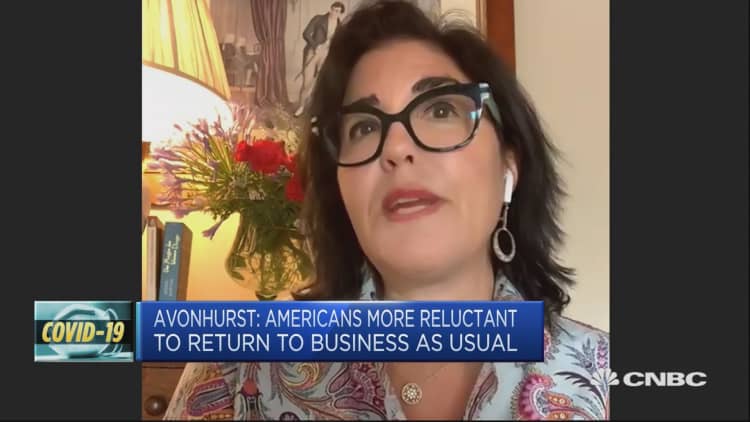While most of the world has gotten used to wearing face masks as a protective measure against the coronavirus, the U.S. has appeared to vacillate wildly.
President Donald Trump appears to have finally adopted a face covering and has seemingly endorsed the wearing of masks, tweeting on Monday that it was a "patriotic" act to do so during the pandemic.
Then on Tuesday, he went further, telling reporters at a White House briefing that "whether you like the mask or not, they have an impact, they have an effect, and we need everything we can get."
In many countries in Europe, anyone entering shops or using public transport has to wear a mask or risk a fine. Face masks are compulsory in many states in India, and not wearing a mask in parts of China can lead to arrest. The U.K. is also bringing in the mandatory wearing of masks in shops and supermarkets from this Friday, after indecision by the government over the benefits of wearing masks.
To the rest of the world then, the White House's evolving message on the issue and U-turn are something of a curiosity.
"We've seen a change in tone from the White House, the president talking about wearing masks at long last. But I must say being based in Europe that this whole debate and politicization of the mask issue, (it) becoming part of U.S. culture wars, is pretty surreal to observe," Tina Fordham, head of global political strategy at Avonhurst, told CNBC Wednesday.

For its part, the World Health Organization updated its guidance in June to recommend that governments ask everyone to wear fabric face masks in public areas where there is a risk of transmission of Covid-19. It did caution that masks were only one tool that could reduce the risk of viral transmission and that they should not give a false sense of protection.
A Gallup poll released in mid-July showed that face mask usage is growing in the States, with nearly nine in 10 people polled saying they have used one in the week prior to the poll.
Yet data on how often masks are being used are more mixed; Gallup reported that 44% of U.S. adults polled say they "always" wear a mask when outside their homes, and 28% say they do so "very often." Three in 10 reported doing so less often, including 11% "sometimes," 4% "rarely" and 14% "never."
Women, Democrats and Northeasterners are most likely to always use mask in public, Gallup found after carrying out a probability-based online survey between June 29 and July 5 — "as Covid-19 cases were surging in several states, including Florida, Texas, Arizona and California."
The U.S. is by no means the worst offender when it comes to face mask usage. A poll by YouGov shows the use of face coverings has increased dramatically since March: The percentage of people who say they wear a mask in public has risen from 7% in March to 75% in mid-July.
The lowest usage of face masks in public is seen in Nordic countries Denmark, Finland, Norway and Sweden, one of the few countries in the world to resist a lockdown.
The U.S. has recorded over 3.9 million cases of the virus and 142,068 fatalities, Johns Hopkins University data showed Wednesday.
Trump's apparent change of heart over the virus, the severity of which he has frequently played down despite the number of cases in the U.S. continuing to rise, was most evident on Tuesday. Speaking to reporters, Trump warned that the pandemic in the U.S. will probably "get worse before it gets better."
Fordham said the comments were an acknowledgement by Trump "that the pandemic won't be beaten and that the economic impact won't be reversed ahead of the election and that this will be a feature of the landscape."
She suggested that the White House's decision to resume daily coronavirus briefings was made with the view that it gave the president a "valuable platform ... in what is going to be a very closely contested election" in November.


